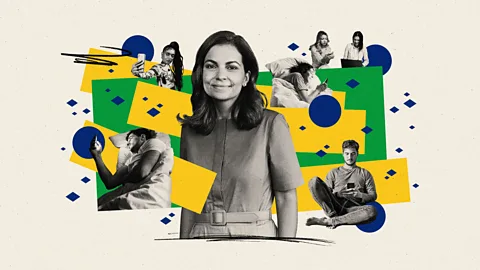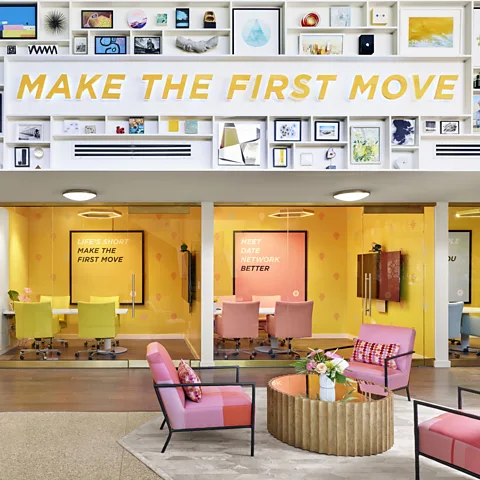How Bumble is pairing AI and human connection to make the perfect couple
 Klawe Rzeczy
Klawe RzeczyLidiane Jones, chief executive officer of Bumble, enters the BBC's Executive Lounge to talk about a decade of dating tech, and navigating the dangers and responsibilities of AI.
Using artificial intelligence (AI) to find true love may seem counterintuitive. But at Bumble, a dating app committed to helping people find authentic connections, Lidiane Jones believes the two aren't mutually exclusive. Jones is spearheading the company's efforts to relaunch the Bumble app, accelerate its product roadmap and incorporate new technologies including AI – all geared towards enriching the user experience.
Jones, Bumble's new chief executive officer, brings more than 20 years of technical expertise in software engineering and product management. With prior roles as vice president at Sonos and former chief executive officer of Slack, she is not wasting time. A month after beginning her tenure, Jones and the team launched Bumble's latest innovation, the AI-powered Deception Detector, which boasts a 99.5% accuracy rate in identifying spam and scams.
"I came to Bumble because of the mission – because of the opportunity that I still see in the market for impacting how women are treated and how women get to define relationships in their lives," Jones tells the BBC. "The idea of equitable and healthy relationships, especially for women, is still one fraught with gaps."
The journey hasn't been all smooth sailing, however. In late February, Bumble cut about 350 jobs globally as a part of a restructuring plan. "This is a challenging time as we have said goodbye to some incredible employees," says Jones. "The mission to create a world where all relationships are healthy and equitable remains unwavering."
As the company takes on an updated strategy to pursue a new era of growth – and approaches its 10th anniversary – Jones talks to the BBC about the interplay between AI and authenticity, and helping women thrive in the next decade.
Executive Lounge
The BBC's series features interviews with executive leaders making innovative, data-driven decisions helping shape the future of business – and paving the path for other leaders to thrive. Read more conversations here.
What role should AI play when it comes to dating and using dating apps?
Our users are looking for authentic connections, and I believe AI also has exciting potential related to safety. Within the first two months of launching the Deception Detector, reports of spam, scam and fake accounts decreased by 45%. We're able to use AI techniques to discover certain patterns, and it's a good use of AI that serves a unique customer need.
We've also previously used AI to launch our Private Detector feature, which automatically blurs lewd images on Bumble, and gives users the control to consent to or decline a photo. We open-sourced a version of Private Detector to make the technology more widely available as well.
Also, creating profiles, especially in the beginning, can be overwhelming at times. And according to our research, 66% of Gen Z and millennial daters say they would use AI to assist them in creating or bettering their dating app profile. Still, I don't want to incorporate AI into Bumble experiences just for the sake of it. I really want it to function as a coach, helping users to express their authentic selves.
I think this is part of making dating fun again and users are still in control of that. It's not about defining a different you. It's about you being able to be your best self.
How do you address the fear people have regarding the use of artificial intelligence when it comes to dating? How do other leaders reconcile similar scepticism around AI?
I believe any AI capability needs to ultimately help people be their best selves. Our goal is to ensure users feel AI is helping us, not replacing us.
Control and transparency are going to be a key part of how we use AI. Transparency is a primary principle of our AI product development so that users remain in control. We want people to know when AI is being used, especially if it's for an interaction. I encourage tech leaders to drive transparency when it comes to using AI, especially with consumer experiences.
Ethically, there should be a high bar when using AI as well. We're looking at the toxicity index, the bias index – all of the potential dangers of AI. This is so the use of AI on Bumble remains a positive experience that still meets our safety and kindness standard. The advanced technology in today's market comes with the responsibility for leaders to take potential risks seriously.
 Courtesy of Bumble
Courtesy of BumbleWhat do you think the biggest challenge in technology will be over the next 10 years?
What we have seen these last three or four years is that the pace of change is accelerating – in technology, macroeconomics and geopolitical climate. The biggest risk is not embracing these changes.
The world we live in is ever-changing, so leaders must stay current with customers' needs. Leaders who are the most adaptable and flexible are going to fare a lot better over the next 10 years. I think we're going to see a dynamic leadership change in the industry because those are the skills that are going to help companies rise.
Bumble will celebrate its 10th anniversary this December. What is Bumble most proud of?
Ten years ago, Bumble started with this idea that women could be in charge and be the partner in the relationship who defines that first move. And what we've seen since then is millions of users who have found connections. I've received pictures of babies and marriage invitations, and have heard many personal stories. It's been exciting to hear the impact Bumble has had in people's lives.
We're looking at this 10-year anniversary as a milestone for redefining what we want the next decade to look like. Women today are different from women 10 years ago. Women today want more flexibility and want to be more self-expressive and we're taking that to heart. We're going to introduce exciting product and branding initiatives this year to begin another great decade for women.
Bumble by the numbers
Bumble has carved out a unique position in online dating. How do you plan to maintain and strengthen Bumble's competitive edge in the market?
There are a few things that have made Bumble stand out these last 10 years. The first is our stance on kind connections, which has guided our community guidelines.
For example, we have a high bar for how people treat each other on our platform. So, when we say healthy and equitable connections, we mean it and put it into practice. That core value of Bumble is really important for me to carry forward. It's going to help continue to set us apart.
Also, when I mentioned capabilities like Bumble's Deception Detector, it's just one of many tools we use to help our members feel safe on our platform. We have AI and machine learning models that have been built for us to use and train in a way that is authentic to Bumble, and meet our standard and brand promise. The plan is to continue building an equitable platform for women to thrive in a safe and fun environment. Those are the things that distinguish us in the market – they are core to who we are, and we're not going to change that.
As the new CEO, how are you going to help promote diversity and inclusion within Bumble and more broadly, in tech?
This question is close to the heart because I'm a woman, an immigrant, and a person of colour. I've felt first-hand which company policies and values have made me feel like I could thrive.
At Bumble, I want us to continue evolving our own policies so we can enable talent to say, "I'm able to do my best work, I'm learning from my peers, I'm having fun and being afforded opportunities", regardless of their background.
I feel a great responsibility to do well at this job because I know it will mean opening more doors for people like me. I want more women and more CEOs who look like me in the industry. I lived in a poor neighborhood in Brazil, and moved to the US on a scholarship. I want to represent determination and empowerment and as I take on this role, I hope that's the legacy I can leave in the industry.
This interview has been edited and condensed for clarity
--
For the best of BBC.com in your inbox every Friday, sign up to The Essential List newsletter for a handpicked selection of features, videos and can't-miss news.
